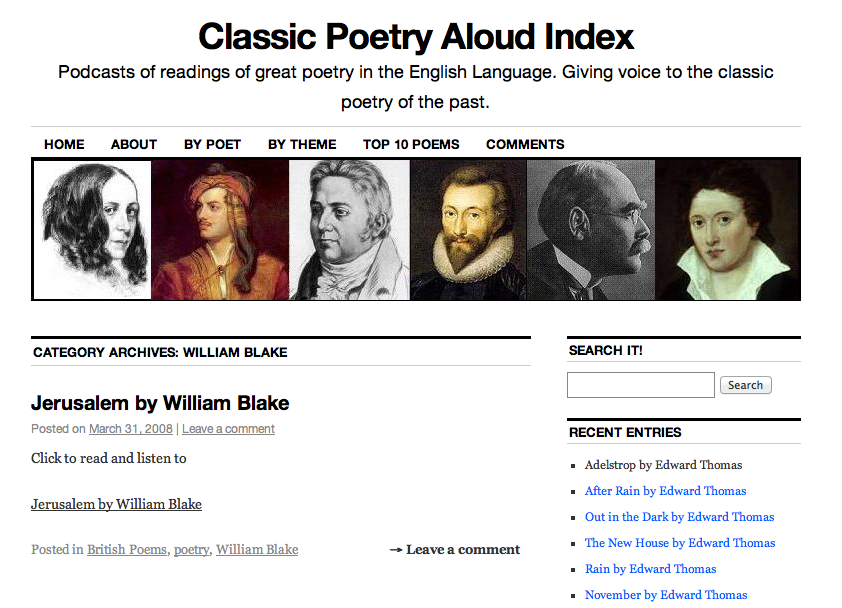Digital Toolbox
WordPress
| Project URL | |
|---|---|
| Logo |  |
| Site screenshot |  |
| Cost and Development Philosophy | Free, open source. |
| Local Installation or Hosted Solution | Both. Hosted via http://wordpress.org & Hosting via http://wordpress.com/. |
| Description | “WordPress started as just a blogging system, but has evolved to be used as full content management system and so much more through the thousands of plugins, widgets, and themes, WordPress is limited only by your imagination.” (source) |
| Use on SpokenWeb Project | WordPress is the Content Management System (CMS) behind the SpokenWeb site. It is a publishing platform that has evolved as a humble blogging software package into a full-fledged CMS since 2003. Its growth has been spurred by a volunteer, peer-reviewed, and open-source force. The core of the software is maintained by handful of developers who add features, improve security, and evangelize its use. A bustling economy of themes and plugins arose around this platform, and some argue that it is this force and fervour that have made it so popular.
In the SpokenWeb context, WordPress has allowed the team to set up a members-only blog to make announcements and archive the development of the project. It is also the CMS platform for storing and displaying, in WordPress parlance, ‘custom post types’ (custom relative to the standard ‘blog’ and ‘page’ post types and associated taxonomies.) We were able to craft the post type around existing collected data on the first cache of recorded poetry material. This was crucial because it meant that the work expended to gather this data (an 800-page document!) could be ported over to the CMS with relative ease.
This process can be duplicated for other such sources, audio readings or not. A custom post type was also created to archive another type of data: audio archives researched across the internet.
A host of popular plugins support the website in ways that the core software does not. This includes better searching capability (work in progress), turning the site from public to private, integration with the SoundCloud audio storage platform, creating file attachments on blog posts and pages, keeping backups of the database and the theme files, and other smaller plugins.
Finally, the template system philosophy behind WordPress is easily one of the most accessible on the web today, making for sites that are well structured, optimized in terms of loading time, and easy to maintain. The challenge from the site’s designer and developer is two fold: how to archive and present information of a unique type, and how to organize the site so that its maintenance can be done by “non-technical people”.
WordPress is an incredibly useful organization of programmers, designers that harbour an open-source publishing philosophy, and as such has served this academic project well.
|
| Evaluation | WordPress is user-friendly software that, once installed and configured, allows users to publish with little or no knowledge of markup or programming languages such as HTML, CSS, or PHP. It can be configured using pre-existing plugins, widgets, and themes that have been created by its community of developers, of which anyone can be a part.
One of it’s disadvantages, from the perspective of a poetry or spoken word site, is that its text-indexing and internal search engine requires some customization to be effective. On the SpokenWeb site, for example, we noticed that the search feature was functioning poorly (i.e. the search function was not finding text that was clearly part of the site) prior to some customization.
Another issue is that, despite WordPress’ user-friendly interface, significant development and customization require someone with advanced web skills, or at least that’s how things have played out so far on our project. Although all team members can make basic changes and additions to the site, all development is routed through one person with the appropriate skills. To be fair, though, this is true of most sites. That is, a technical person is required to maintain backend functionality and take care of basic webmaster duties. I would say that WordPress, with its widespread use, great documentation and vast userbase, makes for a flexible platform for future developers.
There is however, as I mention above, a real design challenge in crafting the site to make it as straight-forward as possible for the non-techie users of the site. This is really hard, and in retrospect, probably something we could have spent more time on, by doing use cases and user training. The core WordPress developers do in fact go through this rigorous software engineering process, so already we’ve benefitted from their labour. But with regards to our project, perhaps this is an equally important question for the creation of a digital platform: putting more emphasis on the user experience through scientific approaches.
One final criticism is that the WordPress WYISWG editor seems, at times and somewhat suprisingly, to do a poor job of formatting text. For example, typing [enter/return] may place a line break in the WYSIWG editor but not in the HTML coding. What you see isn’t always what you get and the surest way to properly format text is to dive into the HTML which is, of course, contrary to the whole spirit of WordPress.There are other similar minor formatting bugs with the editor.
For a good comparison of WordPress, Drupal and Joomla, see: |
| Projects | Classic Poetry Aloud Index (described in the SpokenWeb audio archives, here) “Podcasts of readings of great poetry in the English Language. Giving voice to the classic poetry of the past.” |
| Future Directions | As of March 2012 the WordPress community is thriving, with over 1500 themes and 18,000 plugins available in addition to mobile support for iOS, Android, Blackberry, Windows 7, Nokia and WebOS. WordPress conferences, known as WordCamps, are regularly held throughout the world. |
| References |